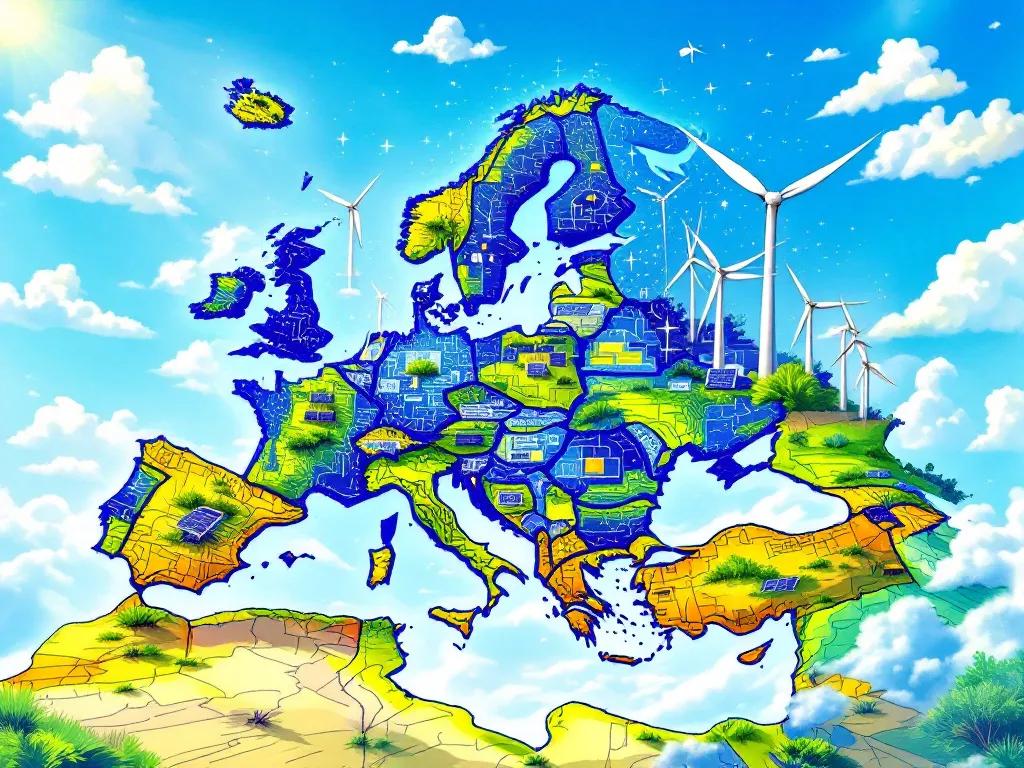Revolutionizing Grid Management: The Role of Advanced Data Analytics in Europe's Energy Transition

Discover how advanced data analytics is revolutionizing grid management in Europe's energy transition. From integrating renewable energy sources to enhancing grid efficiency, explore the technologies driving a cleaner, smarter future.
Revolutionizing Grid Management: The Role of Advanced Data Analytics in Europe's Energy Transition
Introduction
Europe is in the midst of a transformative journey towards a more sustainable energy future. Driven by the urgent need to combat climate change and reduce dependency on fossil fuels, countries across the continent are rapidly transitioning to renewable energy sources like solar and wind. However, this transition brings challenges, particularly in efficiently managing the energy grid, which must now handle varied energy inputs. This is where advanced data analytics steps in as a game-changer.
Imagine being able to predict exactly when the wind will blow or the sun will shine the brightest. Through advanced data analytics, this is becoming a reality, allowing for much smarter distribution and consumption of energy. Introducing analytics into grid management isn't just an upgrade—it's a revolution.
Understanding Advanced Data Analytics in Energy
What exactly is advanced data analytics in the energy sector? It involves using sophisticated techniques and tools to interpret the vast amounts of information generated by energy systems. Key technologies in this area include:
- Artificial Intelligence (AI): Facilitates rapid, informed decision-making by identifying patterns from past data.
- Machine Learning: Enables computers to predict future energy patterns based on existing data.
- Internet of Things (IoT): Involves smart devices that collect and share real-time energy data.
These technologies collaborate to enhance grid management, ensuring energy is utilized more efficiently and effectively across Europe.
Enhancing Transmission and Distribution Efficiency
A significant advantage of data analytics is enhancing the efficiency of electricity transmission and distribution. By utilizing real-time data from Distributed Energy Resources (DERs), energy companies can optimize the grid to meet consumption demands effectively. Companies leverage "grid edge" technologies, which serve as the bridge between the grid and consumers, ultimately leading to improved efficiency ARC Advisory Group.
Case Studies
Consider a few real-world examples. Some utility companies have employed data analytics to significantly reduce operational costs and improve reliability. A study highlighted by Utility Dive demonstrated that incorporating advanced analytics led to a 20% reduction in operational costs while increasing grid reliability by 15%.
Integration of Renewable Energy Sources
Renewable energy sources like solar and wind are crucial. With advanced data analytics, the precise integration of these resources becomes possible, capturing the freshest breeze or the warmest sunlight at their peak. Real-time monitoring and optimization techniques allow grid managers to stabilize renewable resource inflow, ensuring a seamless energy mix enters our grids. This integration enhances grid stability and scalability, facilitating a greater share of renewables in Europe's energy basket World Economic Forum.

Digitalization and Smart Grid Technologies
The term "smart grid" might sound sophisticated, but it essentially signifies empowering our electrical grids through digital technology. IoT sensors and connected devices play a crucial role, collecting and interpreting vast amounts of data and facilitating dynamic grid operations. Beyond stability, these advancements also empower consumers. Imagine controlling your energy use with just a tap on your smartphone. That's the promise of a smart grid.
Consumer Participation and Demand Response
With increased data insights, consumers can actively participate in the energy market. Demand response mechanisms become more effective, enabling consumers to manage their energy consumption intelligently and even sell surplus energy back to the grid Exaron Blog.
The Regulatory Landscape and Ethical Considerations
With great power comes great responsibility, especially concerning data management in the energy sector. Data privacy and cybersecurity are critical considerations, as breaches could have serious ramifications Smart Energy International. Navigating the regulatory landscape is thus crucial. Various frameworks govern analytics use, ensuring ethical deployment and usage.
Recommendations for Data Security
To uphold data security, the energy sector adheres to stringent security practices such as encryption, access control, and regular audits. Organizations are advised to follow these best practices as a norm Exaron Blog.
Advanced Analytics in Energy Trading
Energy trading has undergone a significant transformation, thanks to data analytics. Predictive analytics and AI can now more accurately forecast prices and demand, enabling traders to make informed decisions. Several case studies have shown how these technologies bolster trading efficiencies, resulting in more profitable operations Exaron Blog.
Future Outlook and Innovations
The future of energy analytics is promising. Emerging trends such as AI integration into grid systems, advancements in IoT technology, and more sophisticated data analytics tools will redefine energy handling in Europe. Experts predict these innovations will lead to even more efficient energy grids that perfectly balance supply and demand, minimizing waste and maximizing usage IRENA.
Conclusion
In conclusion, advanced data analytics is not just optimizing grid management; it’s at the forefront of Europe's energy transition. By enhancing efficiency, integrating renewable sources seamlessly, and empowering consumers, data analytics promises a cleaner, more resilient energy future. As we progress, embracing these tools will open numerous opportunities for innovation, growth, and sustainable development in Europe’s energy sector.
By bridging technology and energy, we're not just making grids smarter; we're creating a world that's more sustainable and efficient for future generations. Let's embrace this energy revolution together!
This comprehensive exploration serves as a resource for effectively understanding advanced data analytics' transformative role in revolutionizing grid management during Europe's ambitious energy transition. Whether you're a tech-savvy individual or an industry expert, these insights illuminate the path to greener, smarter energy consumption.